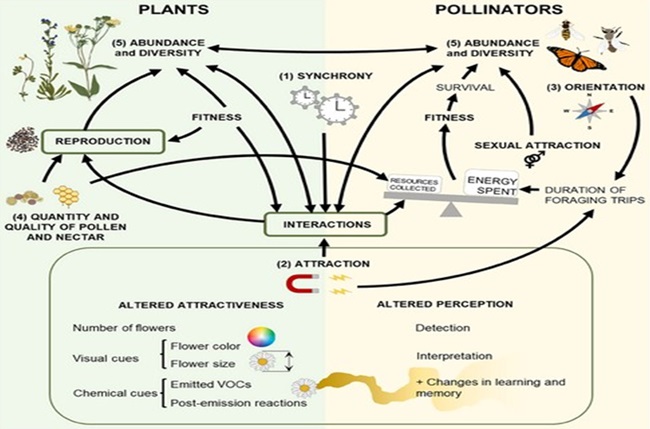(Preliminary Exam: Environment and Ecology)
(Main Exam, General Studies Paper- 3: Environmental Protection, Environmental Pollution and Degradation, Environmental Impact Assessment) |
Reference
- According to a new research study published in the journal Nature Communications, bees and other beneficial insects are harmed more by air pollution than crop-destroying pests.
- The researchers analysed the data to understand the response of insects to air pollutants such as ozone, nitrogen oxides, sulphur dioxide and particulate matter.
About insect pollination
- Insects help pollinate a wide variety of crop and wild plants, providing food security to humans and sustaining wild plant populations.
- However, insect pollinator populations are declining worldwide, primarily due to human activities.
- For example, intensive agricultural pesticide use, destruction and degradation of suitable habitats, and a loss of diversity of floral resources are all causing pollinator numbers to decline.
Key findings of the research study
- According to the study, exposure to high air pollution levels reduced the foraging ability of pollinators, including bees, some insects and butterflies, by 39%.
- On the contrary, there has been no significant impact on plant-eating aphids and other insects.
- Beneficial insects, such as bees and wasps, are disproportionately affected by air pollution because they rely on odor-based communication.
- Many beneficial insects use chemical cues in the air to locate flowers, find mates, or stalk prey.
- Air pollutants can chemically alter odor pathways or interfere with insects' ability to detect them, essentially disrupting their sensory landscape.
- In contrast, many insects rely less on long-range odor signals and more on direct contact or visual cues, making them less vulnerable to the effects of air pollution on airborne chemical signals.
- Of all these factors, air pollution affected insects' ability to find food the most, decreasing by about one-third on average.
- Of the air pollutants, ozone proved particularly harmful to beneficial insects, reducing their ability to thrive and perform their role in the ecosystem by up to 35%.
- Nitrogen oxides also harmed beneficial insects to a great extent.
Effects of air pollutants on plants and pollinators
- Air pollution can reduce the coordination between plants and pollinators by altering the phenology (life-cycle events in plants and animals: flowering, flowering, hibernation, reproduction and migration).
- It may reduce the attraction of pollinators to flowers by altering the signals given by plants or the pollinator's perception of those signals.
- This may hinder pollinator orientation.
- It can alter the quality and quantity of floral rewards.
- It may alter plant and pollinator communities through species-specific sensitivity and reduced pollinator sexual communication.

|

 Contact Us
Contact Us  New Batch : 9555124124/ 7428085757
New Batch : 9555124124/ 7428085757  Tech Support : 9555124124/ 7428085757
Tech Support : 9555124124/ 7428085757






